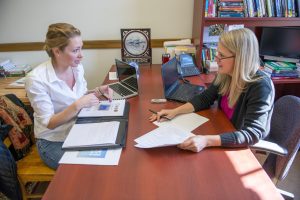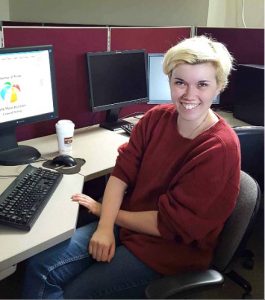Undergraduates Engage in Research with Real World Impact
When we think of the classic undergraduate experience, we may envision large lectures, noisy dorms, fraternities and sororities. But many undergraduate students at UMaine have taken their education to a new level. They are engaged in important research – and not merely to assist and observe. These students are engaged with Maine communities in projects that bring together academia, government and regular citizens.
Here we profile two students making a difference at the Senator George J. Mitchell Center for Sustainability Solutions.
Jena Rudolph, Junior
When city officials, environmentalists, academics and waste management professionals sit down at the table to discuss Maine’s solid waste challenges, UMaine Junior Jena Rudolph doesn’t hang to the side taking notes. She moderates the discussion.
Rudolph is one of a large group of UMaine undergraduates engaged in sustainability-focused research through the Mitchell Center. Rudolph is in her second year working with Cindy Isenhour, Assistant Professor of Anthropology and a member of the Mitchell Center’s Materials Management research team. The interdisciplinary team is working to address current and future challenges associated with solid waste and materials management in Maine.
Rudolph has been an important player at several regional meetings designed to foster dialogue between diverse stakeholders and build consensus for sustainable materials management solutions in Maine. With as many as 30 people around the table, Rudolph is right in the thick of it, facilitating information sharing, idea development and, when necessary, redirecting focus
“We’re trying to get them to discuss what the ideal solid waste management set up might look like. Around the table we have everyone from private solid waste managers to state representatives to haulers and composters. Everyone’s been really respectful and approachable. If a case arises in which dialogue is stalled, I work to redirect the conversation back to the goal of sharing and consensus,” Rudolph said.
Allyson Eslin, Junior
 Allyson Eslin’s research assistant position doesn’t involve working directly with people. But she is the caretaker of stakeholder voices.
Allyson Eslin’s research assistant position doesn’t involve working directly with people. But she is the caretaker of stakeholder voices.
Working with Caroline Noblet, Assistant Professor in the School of Economics, Eslin has analyzed, charted, sub-grouped and culled meaning from a survey of coastal residents in Maine and New Hampshire that measured perceptions of water quality as well as coastal management and policies. Researchers want to know what value citizens place on our coastal resources.
It is an enormous job for a student who had never taken an interest in economics until she, quite accidentally, attracted the attention of one of Noblet’s doctoral students a little over a year ago in an introductory economics class. Eslin was planning to work at a supermarket for the summer when Noblet came calling.
“Honestly, I didn’t have the faintest idea that I would be involved in research. The opportunity literally fell into my lap. I had no experience in economics. I had maybe opened up an Excel spreadsheet five times in my life,” Eslin said with a laugh. “I wanted to work in policy and intelligence. But the more I thought about it, the more a specialty in economics really fit with my intended career path.” For more details on Jena and Allyson, click here.
